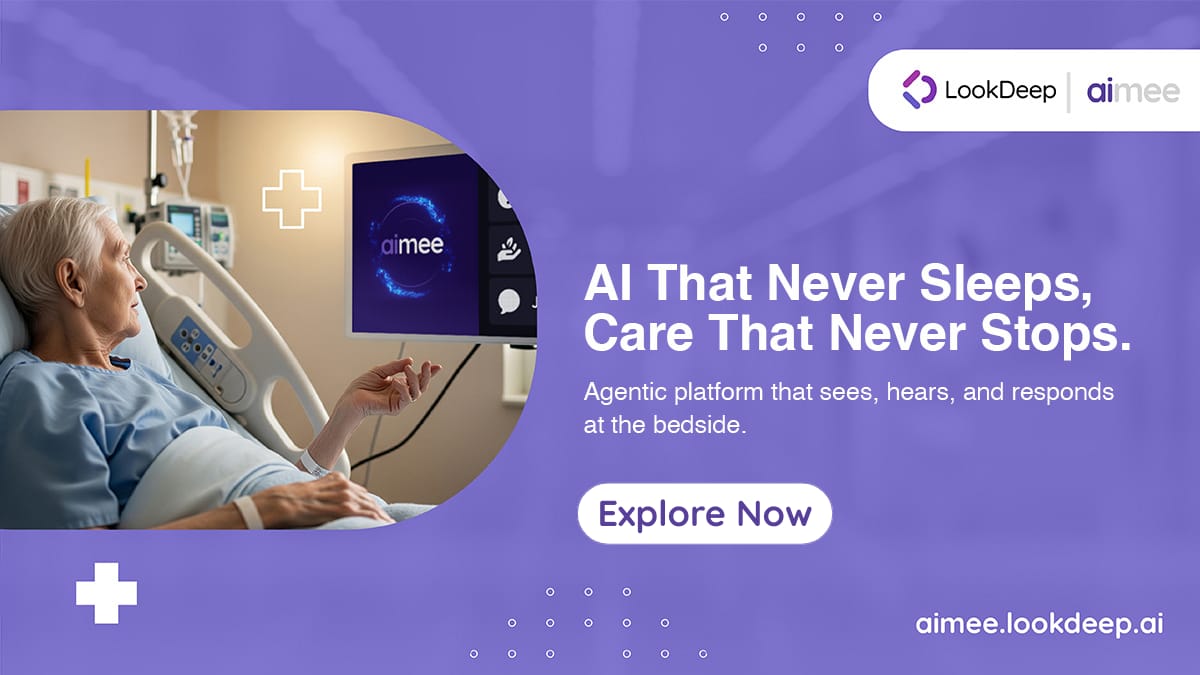Sponsored by: LookDeep Health
Silicon Valley-based LookDeep debuts aimee™ — an agentic, multimodal AI for hospitals that combines vision, audio, and language.
It integrates with EHRs, nurse-call systems, and MCP-enabled tools to understand in-room events and act in real time alongside patients and staff. 👉 Talk to aimee here.
Good morning, readers —
This is what we’re covering this week:
Epic goes all-in on AI
OpenEvidence enters the scribe wars
The next billion-dollar startups
18 new tools/partnerships, 13 funding updates & link-worthy content
Read time: 6 minutes
Our Picks ✨
Highlights if you’ve only got 2 minutes…
1/
Epic goes all-in on AI
Epic used its annual Users Group Meeting in Wisconsin to go big on AI, unveiling more than 160 projects across clinical care, patient engagement, revenue cycle, and operations. CEO Judy Faulkner reframed the company’s mission around “healthcare intelligence,” pointing to Cosmos, its 300M-patient record database, as the fuel for next-gen tools. With MyChart Central, ERP modules, and even outbreak detection in the pipeline, Epic is positioning itself less as an EHR vendor and more as the operating system of healthcare. The 600-pound gorilla has its sights set on AI. Here are the main headliners:
Art, ambient scribe and provider copilot; powered by Microsoft Dragon before going fully native.
Emmie, a patient-facing MyChart assistant for scheduling, navigation, and Q&A.
Penny, an RCM helper automating coding and denial appeals
Cosmos AI, a new family of foundation models trained on billions of medical events to predict risks and simulate patient trajectories.

2/
OpenEvidence enters the scribe wars
OpenEvidence is officially entering the scribe wars. In the same week Epic unveiled a scribe tool, OpenEvidence, the ChatGPT for clinicians and already used by 40% of US doctors, launched “Visits”, a digital clinical assistant purpose-built for patient encounters. Visits transcribes conversations, drafts notes, and integrates the latest evidence and guidelines directly into documentation, leveraging OpenEvidence’s partnerships with 10+ scientific journals. Clinicians can also upload patient records, build a searchable repository, and query across histories, past treatments, and results - all within the same workflow. OpenEvidence is also launching Visits for free for verified U.S. providers and is available now via web and app. It looks like 4 high-level categories are emerging: direct to physician with unmatched distribution (Doximity, OpenEvidence), EHR direct offerings (Epic, etc.), deep-pocketed direct to system with good distribution but low loyalty from docs (Abridge, Ambience, Nabla, Nuance, etc.), and the long tail of niche, specialty-specific players. The battle lines have been formed! (link)(tweet)
3/
The next billion-dollar startups
Forbes just dropped its “Next Billion Dollar Startups” list for 2025. 20 of 25 are AI companies, spanning everything from healthtech to military satellites to automated accounting. It’s a strong signal of where investor conviction is headed. Forbes’ hit rate is impressive, with 56% of past picks becoming unicorns and just 2% flaming out. If you're scouting the next generation of AI winners, this list is worth your time. Here are the healthcare AI adjacent picks:
AcuityMD: is building the go-to platform for med device commercialization, helping manufacturers identify the right physicians using de-identified data from 325 million patients. Trusted by top firms like Becton Dickinson and Olympus.
Assort Health: a voice AI agent that scans physician calendars and matches openings with appointment types.
Collate: founded by YC alum Surbhi Sarna, aims to automate the mountain of paperwork required for clinical trials and FDA approvals, compressing months of regulatory prep into days.
Reducto: cleans up messy enterprise data, using AI to scan documents multiple times like a human reviewer. It’s already processed over 250 million pages for companies like Scale AI, Airtable, and Vanta.
(link)

Tools & Partnerships 🔧
Latest on business, consumer, and clinical healthcare AI tools and partnerships…
TOOLS
GPT-5 outperforms doctors on medical reasoning benchmarks: A new Emory study found GPT-5 scored 95.8% on MedQA and beat GPT-4o by nearly 30 points on multimodal reasoning, showing expert diagnostic ability on rare conditions like Boerhaave syndrome. (link)
Yale New Haven rolls out AI tool to predict patient deterioration: After testing six tools on 400K patients, Yale selected eCART, an AI model that monitors 97 clinical variables to detect early signs of decline and reduce ICU transfers and clinician burden. (link)
Abridge details new system for catching AI hallucinations in clinical notes: In a new whitepaper, Abridge unveiled its hallucination detection framework, combining task-specific models and EHR context to flag and fix unsupported claims. It catches 97% of errors, outperforming GPT-4o’s 82%. (link)
Google unveils Gemini-powered AI health coach for Fitbit & Pixel Watch 4: The new coach delivers personalized fitness, sleep, and wellness insights via GenAI chat and algorithms that optimize routines based on user data. (link)
Google study shows Gemini LLM can interpret wearable sleep data: In a Nature study of 4,163 Fitbit users, Google’s Personal Health LLM accurately predicted sleep outcomes from device data, demonstrating strong potential for personalized wellness insights. (link)
Ambient AI scribes cut burnout at Mass General Brigham, Emory: A new JAMA study found AI documentation tools led to a 21% drop in burnout at Mass General Brigham and a 31% boost in documentation well-being at Emory among 1,400+ clinicians. (link)
Optum launches Crimson AI for surgical analytics: The new platform combines predictive and GPT-based tools to improve OR scheduling, cut supply waste, and boost surgical throughput across health systems. (link)
Grow Therapy launches AI-powered journaling tool for patients: The mental health platform debuted a journaling feature that uses AI to extract key themes from patient entries, helping providers stay informed and support engagement between sessions. (link)
Zyter launches Symphony Agents-as-a-Service platform: The new tool automates clinical and admin workflows by orchestrating multiple AI agents. First deployed with TruCare, it supports 44M+ lives across 45+ health plans. (link)
Artera wins FDA de novo for AI prostate cancer prognosis: ArteraAI Prostate analyzes digital biopsy images to predict long-term outcomes, offering risk stratification for localized prostate cancer based on standard diagnostic workflows. (link)
Marchex debuts AI contact center analytics for healthcare: The new solution improves attribution of patient leads, flags high-value appointments, and alerts staff to patient engagement risks across marketing and intake channels. (link)
JAMA study links AI device recalls to lack of validation, public companies: Researchers found 6.3% of FDA-cleared AI-enabled devices had recall events, with higher rates for tools from public companies or lacking clinical validation, spotlighting safety concerns in the AI device pipeline. (link)
Eleos debuts AI scanner to detect Medicaid coverage changes in therapy sessions: The new “OBBBA AI Scanner” flags life events and diagnosis changes that could affect Medicaid eligibility, giving behavioral health providers early warning to prevent gaps in coverage. (link)
Commons Clinic builds an AI assistant tailored to clinicians' workflows: CommonsAI was built in-house to reflect how doctors actually think, not how EMRs are structured. It uses ambient listening, smart scheduling, and personalized materials to reduce friction, surface tasks, and streamline care. (link)
PARTNERSHIPS
OpenAI + Retro Biosciences: OpenAI and Retro Biosciences used a custom AI model to redesign stem-cell–inducing proteins, making aging cells revert 50x more efficiently than Nobel-winning versions, effectively reversing key aging markers. (link)
CHAI + NACHC: The Coalition for Health AI is partnering with the National Association of Community Health Centers to bring responsible AI to safety net clinics, co-developing playbooks, literacy programs, and vendor certifications for frontline care settings. (link)
West Tennessee Healthcare + Xsolis: West Tennessee Healthcare is piloting Xsolis’ Dragonfly Navigate AI at Jackson-Madison County General Hospital to predict discharge readiness and post-acute placement, aiming to reduce hospital stays. (link)
Atropos Health + Novartis: Atropos is partnering with Novartis to develop AI models trained on real-world data for earlier detection and diagnosis of paroxysmal nocturnal hemoglobinuria. (link)
Deal Desk 💸
Spotlight on latest capital raises, M&A, and investments…
FUNDING
EliseAI, a New York developer of chatbots for the housing and healthcare markets, raised $250M in Series E funding at a valuation north of $2.2B. A16z led, joined by Bessemer Venture Partners, Sapphire Ventures, and Navitas. (link)
Eight Sleep, the AI-powered sleep tech company, raised $100M from investors such as HSG, Valor Equity Partners, Founders Fund, Y Combinator, etc. (link)
Twin, a Mountain View, Calif.-based metabolic health startup, raised $53M in Series E funding at a valuation north of $950m, per Fortune. Maj Invest led, joined by insiders Iconiq and Temasek. (link)
Medallion, an SF-based back-office management automation company, raised $43M. Acrew Capital led, joined by Washington Harbour Partners, Sequoia Capital, GV, Spark Capital, and NFDG. (link)
Wellth, a digital health company specializing in combining daily motivation with behavior change strategies, secures $36M in Series C financing led by Mercato Partners, with participation from FCA Venture Partners, Comcast Ventures, and existing investors. (link)
Method AI, a Boston, Mass.-based developer of image-guided surgical navigation technology, raised $20M in Series A funding. A private family officer led the round and was joined by Cleveland Clinic and JobsOhio Growth Capital Fund. (link)
Develop Health, an SF-based provider of benefits verification and prior authorization automation, raised $14.25M in Series A funding. Wing VC led, joined by Afore Capital, J Ventures, and South Park Commons. (link)
Barti, an SF-based maker of eye-care software, raised $12M in Series A funding. Five Elms Capital led, joined by Vertical Venture Partners, Zag Capital, and Bienville Capital. (link)
Cascala Health, a Boston-based developer of patient data summarization tech, raised $8.6M in seed funding. Flare Capital Partners and Eniac Ventures led, joined by Tau Ventures, Redesign Health, and others. (link)
Convoke, a South San Francisco-based AI-powered operating system for drug development, raised $8.6M in seed funding. Kleiner Perkins and Dimension Capital led the round and were joined by others. (link)
Molecular You, a Vancouver-based personalized health platform, raised $5M in Series A funding. Voloridge Health led, joined by Dynamic Leap. (link)
MERGERS & ACQUISITIONS
Tempus + Paige: Tempus AI acquires digital pathology startup Paige for $81.25M. Paige brings a 7M-slide dataset, FDA-cleared tools, and deep AI talent. Tempus says the deal accelerates its plans to build the largest foundation model in oncology. (link)
GRANTS
Bill Gates is funding the $1M Alzheimer’s Insights AI Prize: The prize is to build AI agents that autonomously mine decades of Alzheimer’s research and patient data, with the winning tool released free to scientists. (link)

market snapshot as of 8/25/25
Other Relevant News 🔍
News, podcasts, blogs, tweets, resources, etc…
Visuals of the Week 📸
Funny memes, cool pics, and interesting data from around the web…




That’s it for this week friends! Back to reading — I’ll see you next week.
Stay classy,
PS. I write this newsletter for you. So if you have any suggestions or questions, feel free to reply to this email and let me know
How was this week's newsletter? Tap your choice below👇





